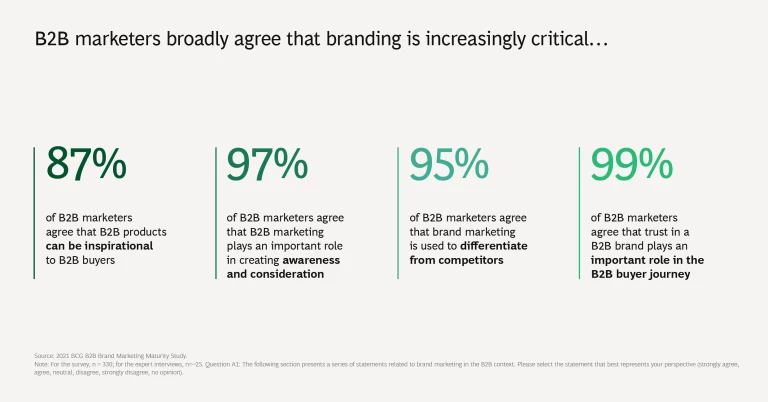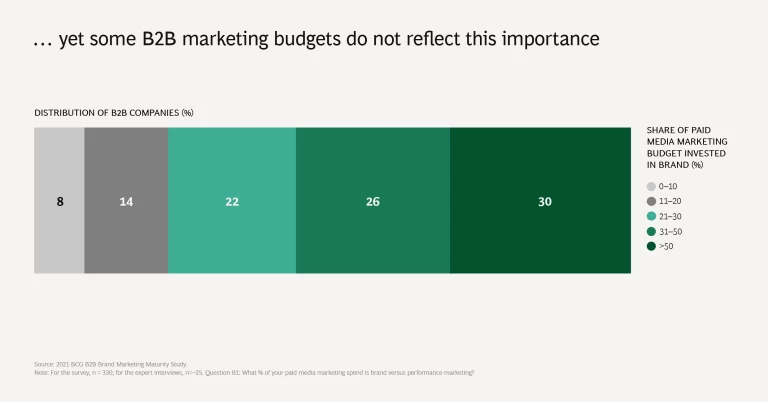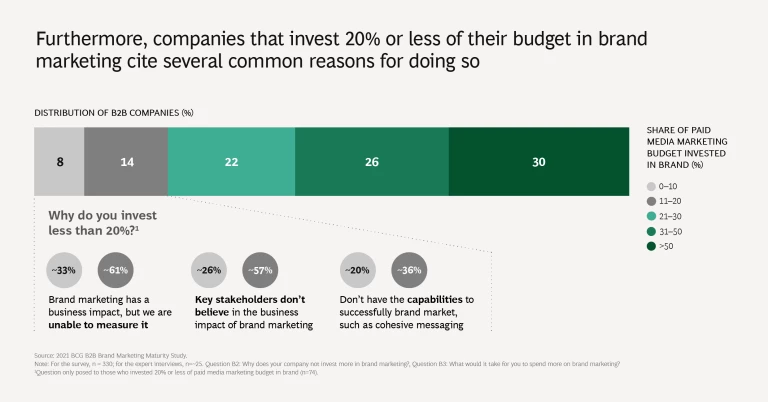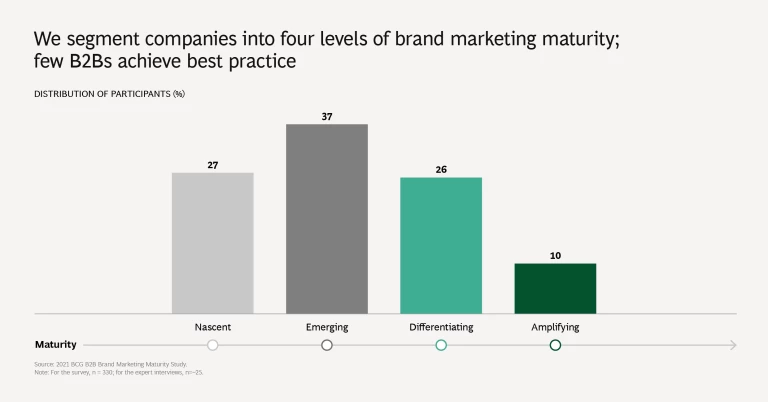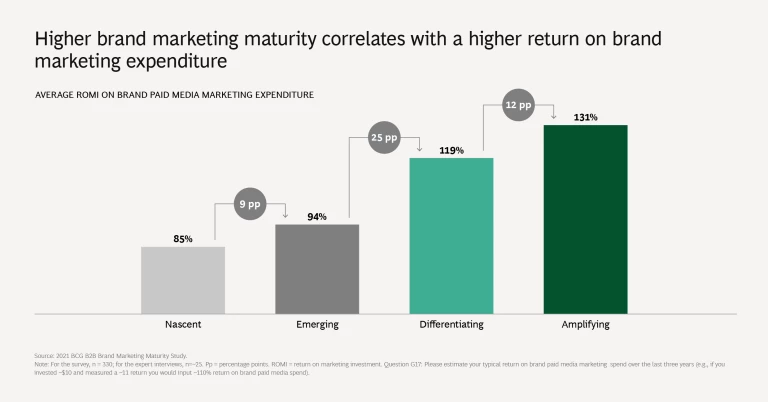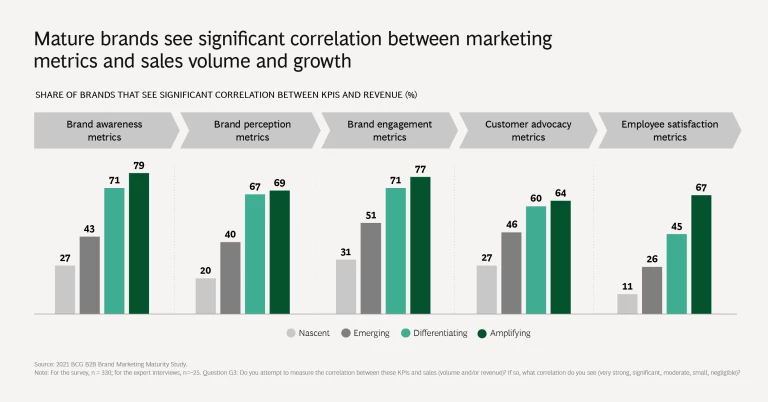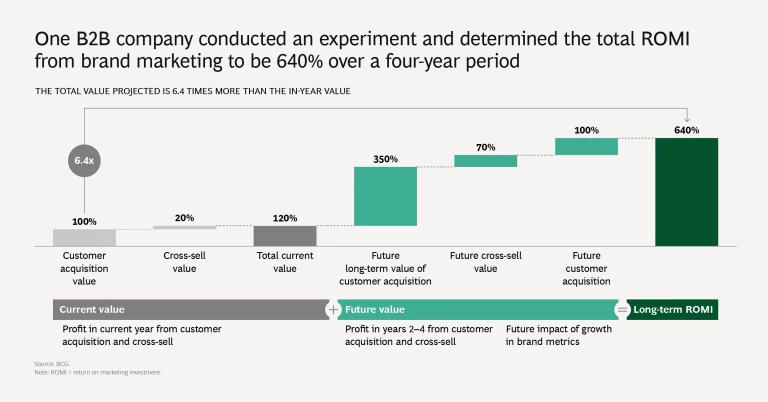CMOs know that brand marketing can be as effective for B2B companies as for consumer companies. Now, new data can help them convince the rest of the C-suite.
Companies in B2B industries often debate the value of brand marketing. Organizations believe in it, but results are harder to quantify when compared with marketing efforts that emphasize the performance of products and services. New data from BCG and Google shows that underestimating the value of brand marketing is a mistake. Brand marketing improves not only the brand but other components as well, such as the return on marketing investment (ROMI) on performance marketing, customer advocacy, and even employee satisfaction. The bottom line: B2B companies that underinvest in brand marketing are literally selling themselves short.
When B2B companies market their products and services, they have a strong tendency to focus on performance attributes, such as price and features, typically avoiding broader initiatives to promote the overall company brand. Marketing budgets reflect this thinking, with companies typically underinvesting to build their brand and devoting a larger share of spending to traditional marketing. Nearly one-quarter of B2B companies devote less than 20% of their marketing budget to brand.
Yet that is a missed opportunity. A recent survey conducted by BCG and Google found that brand marketing can be just as effective in the B2B realm as in the consumer realm—if not more so. Companies that are more mature in terms of brand marketing generate a higher ROMI on those efforts; moreover, strong brand marketing capabilities actually reinforce performance marketing, leading to better engagement overall.
The survey drew responses from marketing leaders at 330 large B2B companies in seven industries worldwide, and we supplemented that data with in-depth interviews of more than 25 executives. (Some participating companies have combined B2B and B2C business models, but no consumer-only companies were included.) The findings reinforced both the current lack of emphasis on brand marketing by many B2B companies—and the potential value for organizations that take steps to improve.
The good news is that marketing leaders are aware of the value of branding. After all, human purchasing behavior is consistent, regardless of whether people are buying for their company or themselves. Among respondents, 97% say that brand marketing plays an important role in creating awareness and consideration, and 95% say that brand marketing can help a company differentiate itself from competitors.
Yet that belief doesn’t translate to investments. At nearly half of responding companies, brand marketing budgets make up less than 30% of the overall marketing budget. Why the disparity? Companies among those with the biggest imbalances in marketing expenditure, where brand investments are less than 20% of the total budgets, identified several common challenges. B2B companies often struggle to measure the impact of brand initiatives, and they lack the internal capabilities, including creative skills, to execute campaigns. In addition, other key stakeholders in the leadership team, particularly CFOs and heads of sales and product units, aren’t convinced of the value of brand marketing, and are thus unlikely to fund it, even if the CMO is a believer. And we don’t blame them for maintaining a “prove it” attitude. Brand marketing shouldn’t get a free pass; it must drive measurable valuable in both the short term and the long term.
But our research highlights that underinvesting in a brand can have serious ramifications. As the digital marketing director of a large industrial company said, “We have very minimal corporate investment in brand. This makes it hard for us to ramp up a campaign when we launch a new product, because we don’t have a brand to build on.” Without a strong brand in place, each new product or service offering starts essentially from scratch.
Four Levels of Maturity
BCG has identified four levels of digital marketing maturity: nascent, emerging, differentiating, and amplifying. And the findings from our survey show significant room for companies to grow. In our sample, most companies (64%) sit at one of the first two levels of maturity, while only 10% are at the highest level.
Among the most noteworthy results from the survey is that higher maturity correlates with a higher ROMI. Specifically, companies that advance from the emerging level to the differentiating level see a corresponding increase of about 25 percentage points in terms of ROMI. But B2B companies that have reached the amplifying level of maturity perform far better, generating returns on their brand marketing investments that were 46 percentage points higher than those of companies at the nascent level. These top performers unlock significant long-term value in such areas as new-customer acquisition, cross-selling to existing customers, increased brand awareness, and overall sales growth. Notably, they also generate a higher return on their performance marketing investments.
Top performers generate a higher performance ROMI and unlock significant long-term value in such areas as new-customer acquisition, cross-selling to existing customers, increased brand awareness, and overall sales growth.
In some cases, the ROMI can be astoundingly high. For example, BCG worked with a B2B company on an experiment to determine the gains it could generate from brand marketing investments. The company found that the long-term ROMI of those initiatives—including cross-selling opportunities for current customers, the acquisition of new customers, and the retention of those customers after their initial purchase—was approximately 640% over four years.
Moreover, the correlation between brand marketing maturity and performance shows up consistently in most metrics. Companies that are more mature in terms of brand marketing capabilities see a corresponding improvement in such KPIs as brand awareness, brand perception, brand engagement, customer advocacy, and employee satisfaction—all of which translate to increased sales.
These results should help CMOs convince CFOs and other leaders who may be (understandably) skeptical of the value of brand marketing. The data shows unequivocally that these initiatives can be profitable, in both the short term and the long term, across a range of performance metrics—leading to a dramatic improvement in financial performance.
What Differentiates the Top Brand Marketers
The survey highlighted six specific attributes of the most mature organizations in terms of brand marketing.
A Clearly Defined Strategy and Brand Value Proposition. Amplifying companies are twice as likely as companies in the nascent category to view their brand value proposition as effective and powerful. Those with strong brands show a 74% higher return on their brand marketing investment, and hold a 46% larger market share, than weaker brands.
A Strong Focus on Measurement. Amplifying companies are not only more proficient at measurement, but they measure a wider range of performance metrics. They assess about 50% more KPIs than nascent organizations, and they’re significantly more likely to measure impact after a customer purchase with metrics such as customer advocacy and loyalty. Measuring the impact of brand marketing isn’t easy, but amplifying companies share several characteristics:
- Sustained initiatives to prove both the short-term and the long-term impacts of brand marketing
- A focus on test-and-learn methodologies to quantify results
- More advanced customer research and insights
Diverse Skills Across the Marketing Team—Particularly Creativity. Companies need to be able to tell their story in emotionally resonant ways. As the global brand director at a tech company put it, “You have to be a little whimsical, fun, and unexpected”—attributes that many B2B companies may not be known for. In addition, the data shows that marketers at amplifying companies invest in talent across a wider range of skills than less-mature companies. Nascent marketers invest in one to two skills, on average—most commonly, creative content development and digital marketing . Amplifying and differentiating marketers, however, invest in five skills, including creative management and customer segmentation, which are required to generate deep customer insights .
Activation Across All Channels and Customer Touch Points—Especially Digital. Companies at the highest level of maturity consistently and effectively engage with customers across all touch points and throughout the entire customer journey, from initial awareness through retention and loyalty. Among survey respondents, amplifying brands were more than twice as likely as nascent brands to have increased their expenditure on brand online videos by more than 10% over the past three years. What’s more, companies that invest more than half of their brand dollars in digital generated returns that were about 25% higher, regardless of their maturity levels. (Direct mail spending, on the other hand, is correlated with a decreased ROMI.) Regardless of channel, it’s critical to align content across all channels and to effectively integrate brand and performance marketing so that customers have a consistent and cohesive experience.
A Cross-Functional Operating Model That Engages Stakeholders Throughout the Organization. Amplifying companies take a fundamentally different approach to executing brand marketing. They involve multiple teams across the organization, each integrating a range of perspectives and expertise. “Our branding happens with a small group across different functional groups, including research, sales, brand, and strategy,” said the global brand director of a large financial software company. Amplifying companies also have an agile and innovative approach that involves continuous, iterative testing; a flexible budget mentality with the ability to shift dollars; a streamlined process to push brand content out through all channels; and support from senior leadership. In amplifying companies, on average, at least two members of the C-suite, and sometimes other senior executives, are involved across all phases of the brand marketing journey.
Automated and Integrated Technology. To support these capabilities, companies need the right marketing technology. As one VP of global performance marketing at a large B2B technology company said, “You need a content management system and analytics to measure. You also need automation. This isn’t about marketing talking to sales—this is about enabling your whole workforce.” Amplifying companies have effective tech infrastructure in such areas as communication to customers (for example, paid search and display ads), content development and digital asset management, data management, audience intelligence, and analytics. Moreover, their technology stack is integrated and linked with a clear data strategy, ensuring sufficient and high-quality data, consistent data structures across countries and brands, and a means to close any data gaps that exist.
In sum, the survey results underscore what many B2B CMOs already know: brand marketing is critically important. Strong brand marketing can deepen customer relationships, improve the return on marketing investment, and augment the lifetime value of customers. Because most B2B companies are not sufficiently mature in their brand marketing capabilities, there is an opportunity for aggressive, ambitious companies to invest in brand as a growth engine for the business.


